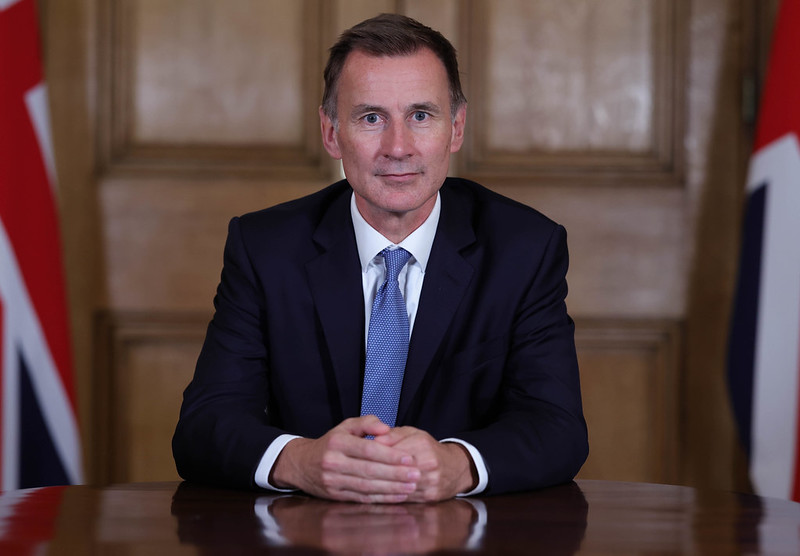Chancellor Jeremy Hunt has unveiled a connections action plan to cut grid action delays by 90% and lifted the windfall tax for new renewable projects in this year’s Autumn Statement.
The grid connection queue is facing significant overcrowding with 232 renewable projects – accounting for roughly 45GW of capacity – due to be connected by 2025. Addressing the long-waiting time experience for clean energy businesses to access the energy grid, Hunt revealed that following talks with businesses such as National Grid, SSE and Octopus Energy, a connections action plan will be published today (22 November).
“These measures will cut grid action delays by 90% and offer up to £10,00 off electricity bills over ten years for those living closest to new transmission infrastructure,” said Hunt.
The chancellor added that a full government response to the Winser report – which outlined how Britain can halve the time required to build grid infrastructure – will also be published today.
John Pettigrew, chief executive of National Grid, welcomed the “bold plans set out by government today”.
“A spatial energy plan and accelerated planning consent will bring clarity, authority and urgency to what needs to be built and where, while new community benefit proposals will ensure local people remain at the heart of the energy transition. The connections action plan will deliver fundamental reforms needed to enable us to plug clean energy projects in faster, and build on the progress already being made,” Pettigrew continued.
“The intent is clear and welcome; now these plans must be implemented at pace to capture the economic opportunity of the energy transition and keep Britain on target to achieve its climate goals.”
This is a positive step towards a realignment with a clean energy system, especially in comparison to last year’s Autumn Statement in which Hunt revealed the 45% windfall tax on electricity generators. The Electricity Generator Levy (EGL) too has been addressed in this year’s statement with the wholly welcome announcement that new renewable generation projects – including extension to existing projects – given the green light on or after 22 November will be exempt from the EGL.
Clean energy receives a cut of £4.5 billion support package
Addressing the green energy and advanced manufacturing industries, Hunt referred to international investor calls for a “longer term strategy” for their industries.
The chancellor proceeded to unveil these long term plans, which take the form of a £4.5 billion support package over the five years to 2030 to attract investment to strategic manufacturing sectors. This will include £2 billion for zero emission investment in the automotive sector and £960 million for the new green industries growth accelerator focussed on offshore wind, electricity networks, CCUS and hydrogen – as announced on 17 November.
“These targeted investments will ensure that the UK remains competitive in sectors where we are already leaders and innovators in sectors where we are not,” said Hunt.
Taken together, Hunt claimed that this support is estimated to attract £2 billion additional investment every year of the next decade.
The green elephant in the room
Despite a positive outlook on the government’s grid connections action plan and relaxation of the renewable windfall tax, members of the renewable industry have begun expressing their concern over a somewhat limited focus on enabling the energy transition, especially energy efficiency within this year’s Autumn Statement.
Director at the Energy and Climate Intelligence Unit (ECIU), Peter Chalkley said today’s speech showcased the chancellor “entering the global race to incentivise clean industries to set up here, rather than elsewhere”. However in the context of increasing investment incentives from overseas, such ad the US and EU, Chalkley wonders whether the measures announced today are “too little, too late”.
“The Government will likely need to do more in the coming months to calm investor nerves. Things over the past few months have looked, to say the least, a little confused,” added Chalkley.
There was also no mention of energy efficiency improvements, a particular concern as Ofgem is likely to reveal an increased Q1 price cap tomorrow.
“The Chancellor had nothing to say on energy efficiency. Many had been calling for a stamp duty rebate for those who invest in upgrading their homes. Coupled with the PM’s recent row back on requirements for landlords to provide warm, insulated homes, this leaves many families colder and poorer,” said Chalkley.
“The gaps in this Autumn Statement are devastating, especially for the poorest households. While increasing benefits in line with inflation is welcome, it does nothing to directly reduce energy bills or to help millions of low-income households not on benefits. An ‘average household’ is now paying £800 more per year to heat and power their homes since the start of the energy crisis,” said Adam Scorer, chief executive of the fuel poverty charity National Energy Action (NEA).
“Energy debt is at record levels. Yet, today’s Autumn Statement does nothing to help. It fails millions of the poorest households who suffer, and sadly – in too many cases – die, because of cold and unsafe homes.






